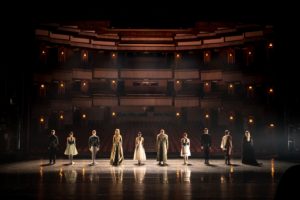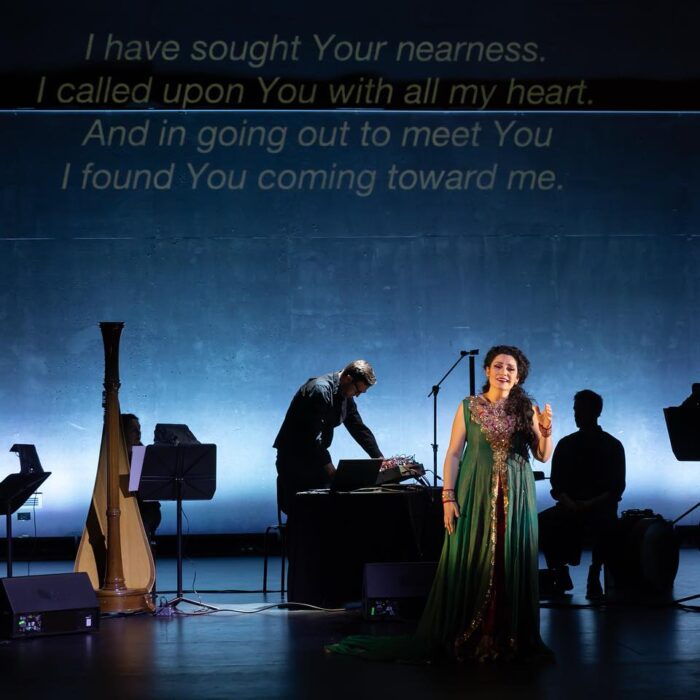
Lithuanian National Opera’s New Normal Looks Somewhat Familiar
By Polina LyapustinaIt was a hot summer afternoon and the journalists gathered in the shadow of Lithuanian National Opera’s massive building. Here, LNOBT art-director Sesto Quatrini, general manager Jonas Sakalauskas, principal conductor Ričardas Šumila, and choreographer Martynas Rimeikis are preparing to reveal a new season’s program.
Everything gets off to a great start. Nothing reminds us of the global crisis still raging around the world. The starting point is that artists, musicians, and staff are already back in the theatre and at work. LNOBT plans some outdoor events this summer. They are going to invite up to 1,000 people to the inner yard of the Palace of the Grand Dukes on July 6 for the concert performance of “I Lituani.”
It seems unreal.
One New Production
I suppose it sounds even more impressive for Sesto Quatrini, who is now on Lake Como and speaks via Skype. He starts his speech celebrating health and the way Lithuania (which recently lifted quarantine after 93 days) arrived at this point. He believes the greatest achievement of LNOBT is that the theatre plans to start a regular season in September.
Quatrini praises maestro Ričardas Šumila, a young conductor who now holds the position of principal conductor of LNOBT. This year, we will see him on the podium of almost every important event. Šumila has a long working history with different orchestras in Lithuania and abroad, and has developed a very pragmatic and critical view of his own work as well as of the orchestra composition and development. It gives us hope for some evolution within the LNOBT orchestra in the upcoming season.
While last season the LNOBT was scheduled to have five premieres, there will only be one premiere this year – Verdi’s “La Traviata.” The production will be very Italian, led by a team that includes director Fabio Ceresa, set designer Tiziano Santi, and costume designer Giuseppe Palella. Their plan is to present a classic but stylistically fresh perspective on the famous tragic story. Other than that, there are almost no details about the cast as auditions were just announced recently. The production is reflective in many ways — new but classy, with some new faces, beloved stars (Edgaras Montvidas is set to sing Alfredo), and a fine Italian hand (idiomatic and literally).
This “Traviata” should suit the theatre’s comeback well.
The long-awaited premiere of “Ana Bolena” will finally take place in the theatre in August as a pre-release of the season and will be the first indoor event after the pandemic lockdown. A co-production with Teatro dell’ Opera di Roma was planned to open in Lithuania this spring.
New Policies
LNOBT declared a new policy regarding performers: the theatre will place an emphasis on highlighting all Lithuanian international stars this season. Kristian Benedikt, Edgaras Montvidas, Asmik Grigorian, Justina Gringyte, Kostas Smoriginas, and very likely Violeta Urmana are headed back to the stage of the LNOBT. The National Opera seems intent on renewing relationships that may not have been as solid under previous management.
More international guests are coming as well. The main highlight is soprano Olga Peretyatko, who comes by invitation of Maestro Quatrini for a gala concert. Maestro Quatrini is also very proud to bring Italian soprano Francesca Sassu to Lithuania to sing the title role in Ana Bolena.
Young artists will have a chance to prove themselves in open auditions during the summer and Second International Virgilijus Noreika Competition in September.
During a Q&A session, journalists asked about the survival of the institution. Financially, LNOBT feels quite confident. Though the theater is facing an expected one million euro shortfall in revenue, no one is in danger.
“We are all having a hard time now, but it’s nothing about closing or having our ensemble reduced. We will continue as it was planned,” General Manager Jonas Sakalauskas said. The ticket sales will be reduced according to recommendations by the Health Ministry and are supposed to be at about a 35 percent capacity level.
LNOBT definitely has something to celebrate. The new season looks promising and keeps the direction of development set last year. The local audience seems to be happy to be back in the theatre. And yet, this local perspective does raise some questions regarding the future of the opera industry in Lithuania.
“New Normal?”
What makes me feel uncertain is that there is still no plan in place for how the organization would handle a possible second wave of COVID-19. During this lockdown, the organization’s connection with its audience was muted. The organization remained relatively quiet in the midst of the streaming revolution taking place around the opera world.
Currently, there are no plans on how to reach people outside the live, in-person theatrical experience. While the company is clearly following safety regulations and implementing some changes, there is also a feeling that the “new normal” will be, well, the same old normal, as if there is no need to change anything beyond the seating limitations or approaches to artistic personnel.
This spring taught us that we can’t take simple meetings or going outside for granted. It’s exciting to see the company ready to move forward with its season, but it would be more enticing if we saw the company also looking toward a more varied future in which opera must be explored beyond the traditional experience. Beyond the walls of the massive Soviet building.
The survival of all opera companies depends on it.
Categories
Special Features


